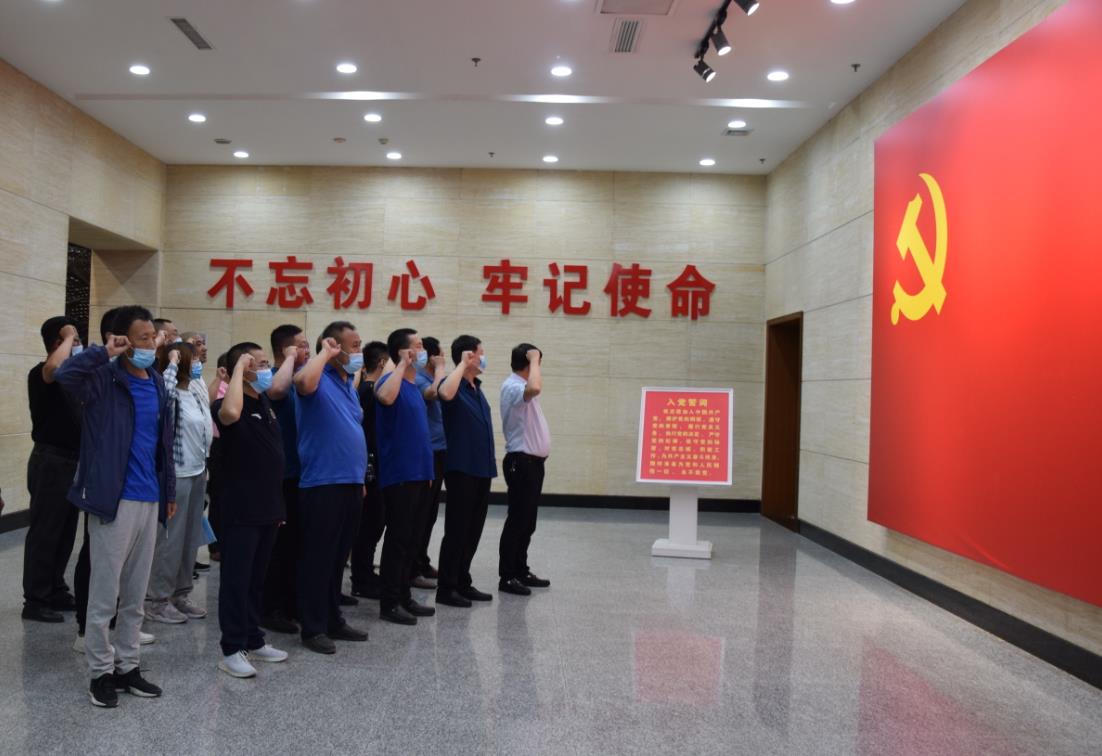
Workers assemble cells at an electric vehicle plant of BYD in Taiyuan.

Workers assemble tunneling machines at a construction machinery plant of Datong-based Zhongke Weishi.
As a province that used to rely heavily on coal mining, Shanxi in North China is now diversifying its economy through industrial reform.
According to the provincial government of Shanxi, the province is using cutting-edge technologies such as cloud computing, big data, mobile internet, the internet of things, industrial internet and blockchain to create eight new economic pillars.
The eight pillars are: information technology, civil aviation, finance, cultural tourism, new energy and new materials, natural gas, advanced manufacturing and modern chemicals.
The outbreak of COVID-19, which began in December and declined in March in China, has not stopped the pace of industrial structure reform.
According to the Shanxi provincial government's requirements on normalizing economic activities, many businesses and investment promotional organizations in the province have stepped up their efforts to attract investors to these emerging sectors.
The administrative committee of the Changzhi Economic and Technological Development Zone in Changzhi city, southeast Shanxi, is one such organization.
Li Wenbin, head of the committee, has been busy meeting investors, making research tours and offering services to local businesses.
"I met some visiting businesspeople from Jiangsu province on April 3," Li said.
The business representatives were from Donghua Aluminum Technology in Jiangyin city, Jiangsu province.
The delegation visited the local Zhongde Group, a producer of cells for new energy vehicles, hoping to manufacture and provide cell cases for the company.
According to Li, the committee's officials made great efforts to help the two companies reach a deal.
They held a special seminar to explain the development zone's advantages in policies, market potential and resources to the investor.
As one of the demonstrative areas of Shanxi's industrial restructuring, the Changzhi zone has competitive industries such as advanced manufacturing, solar power equipment production, new energy and new materials, according to Li.
The official said since the beginning of 2020, the zone has signed 47 investment projects, with total funding reaching 11.78 billion yuan ($1.66 billion).
In addition, Li said 22 investment projects are under construction, with investment totaling 6.82 billion yuan.
While investment officials are busy promoting local investment destinations, the province has seen gradual production resumption in its emerging industries.
In the Shanxi Transition and Comprehensive Reform Demonstration Zone located on the borders of Taiyuan and Jinzhong cities, all the enterprises above designated scale-which refers to companies with annual sales revenue surpassing 20 million yuan-have resumed their operations, according to the zone's administrative committee.
SND New Energy Special Vehicle was one of the earliest companies in the zone to resume production.
"Our company resumed operations on Feb 14 and now about 99 percent of our employees are back to work, except for those who are still in Wuhan, Hubei province," said Que Wenxiu, president of the company.
SND was founded in 2018, with a total investment of 1 billion yuan. It has a designed production capacity of 100,000 special vehicles a year, which are used in such fields as cold-storage transport, street cleaning, snow removal and emergency rescue.
Despite COVID-19's negative influence on the market, the company recently secured orders for 286 cold-storage vehicles, according to Que.
The executive noted that his company started trial operation last year, with only 48 vehicles produced.
"As formal operation begins, we are expecting to produce 5,000 vehicles this year, with an estimated revenue of 1.5 billion yuan," Que said.
The executive said he is optimistic about the new energy vehicle industry, especially in sectors for special vehicles.
In the IT sector, local computer manufacturer 100Trust signed an agreement with the Taiyuan-based North University of China for all-round strategic cooperation.
NUC, formerly known as North China Institute of Technology, is a multidisciplinary university with expertise in IT research. 100Trust is a manufacturer of computers, servers and components based on China's independently developed central processing units like Kunpeng developed by Huawei and Loongson by the Institute of Computing Technology of the Chinese Academy of Sciences.
"The collaboration with a strong research institute will improve our competitiveness in the domestic market," said Wang Xianchao, founder and board chairman of 100Trust.
He added that the partnership will also make 100Trust an important base of research and training for NUC.
The authorities in Shanxi made it clear that the IT industry is a vital sector for the province to foster new growth areas and upgrade traditional industries.
A document recently released by the provincial government called IT-based innovation "the No 1 program in Shanxi" as it can lead to "a beneficial ecosystem for startups in many emerging industries".
By YUAN SHENGGAO
 山西路桥:党建引领 建好“四好农村路”山西路桥建设集团党委扎实开展“党建质量提升年”,实施“六大工程”,立足“十四五”高质量、高速度、高效益发展的战略基点,全面提高党建质量和党建引领发展水平,为打造“国内一流的交通基础设施投资、建设、施工现代化企业集团”提供坚强政治保障。
山西路桥:党建引领 建好“四好农村路”山西路桥建设集团党委扎实开展“党建质量提升年”,实施“六大工程”,立足“十四五”高质量、高速度、高效益发展的战略基点,全面提高党建质量和党建引领发展水平,为打造“国内一流的交通基础设施投资、建设、施工现代化企业集团”提供坚强政治保障。
 常住人口3491万 山西人口普查数据"出炉"山西省统计局向社会通报山西省第七次全国人口普查主要数据。数据显示,山西省常住人口为34915616人,比2010年(第六次全国人口普查数据,下同)减少2.23%,年平均减少0.23%。山西省常住人口总量减少,主要受人口流动变化等因素影响。
常住人口3491万 山西人口普查数据"出炉"山西省统计局向社会通报山西省第七次全国人口普查主要数据。数据显示,山西省常住人口为34915616人,比2010年(第六次全国人口普查数据,下同)减少2.23%,年平均减少0.23%。山西省常住人口总量减少,主要受人口流动变化等因素影响。